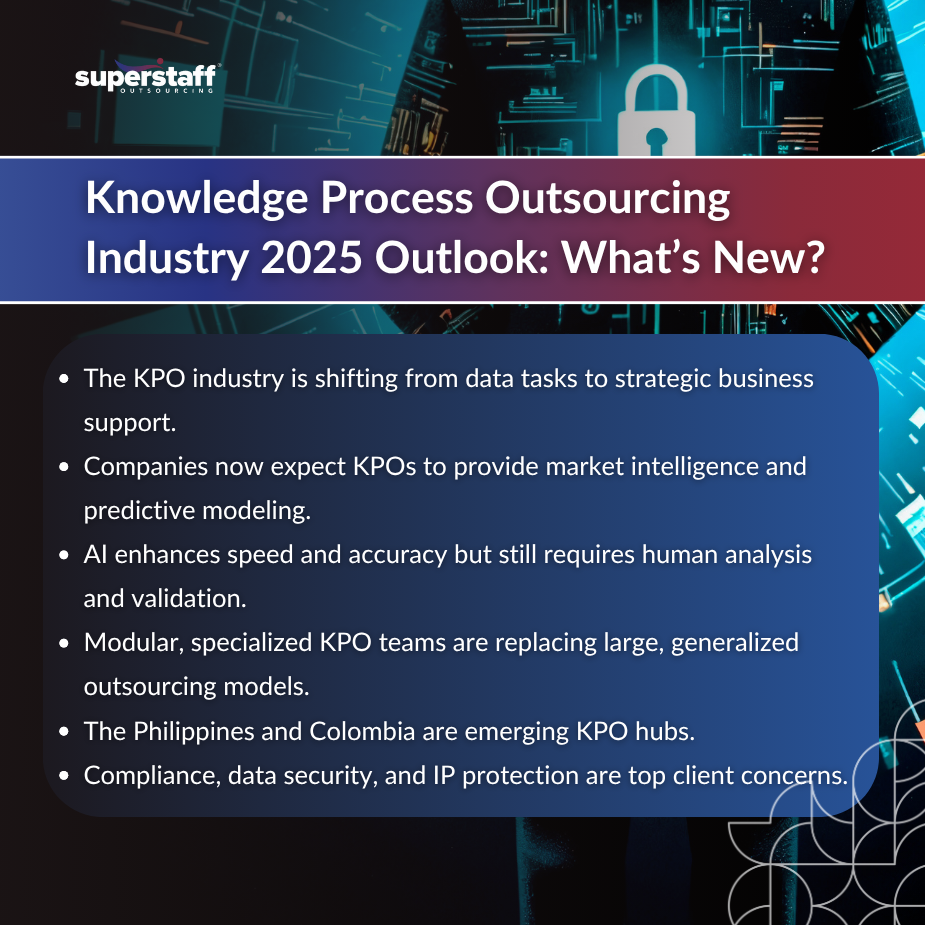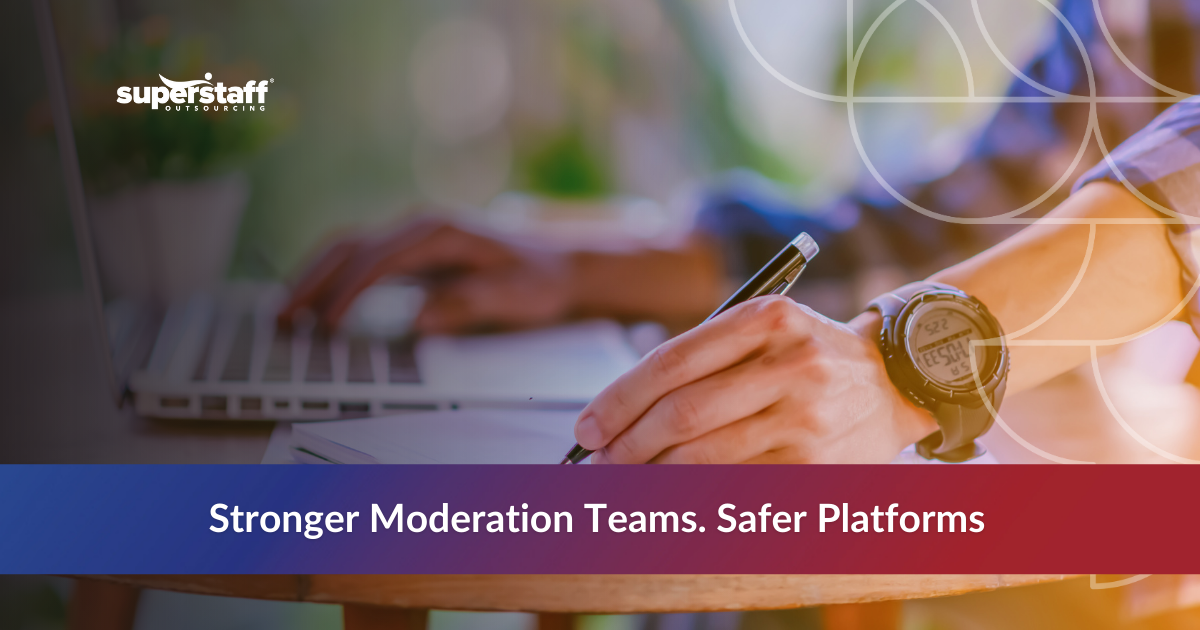
The KPO sector isn’t just growing—it’s transforming. Once seen as a cost-efficient way to handle data-intensive tasks, the knowledge process outsourcing industry has evolved into a vital engine for strategic decision-making.
Businesses today aren’t just outsourcing to save money—they’re seeking specialized partners who can deliver insights, innovation, and domain-specific expertise. As global markets become more complex and fast-paced, the value of outsourcing lies not in task execution alone, but in empowering smarter business strategies through high-level analysis, research, and forecasting.
In 2025, the knowledge process outsourcing industry will be shaped by a new set of priorities: deeper domain specialization, seamless AI-human collaboration, and modular team structures that align directly with client needs. KPO providers are no longer just service vendors—they’re strategic extensions of the businesses they support.
This blog dives into where the industry is headed next, unpacking the most important trends and innovations that will define the future of knowledge process outsourcing.
KPO Is Evolving From Data Support to Strategic Decision Enablement
The core value of KPO is moving beyond data processing to enabling smarter business decisions.
The traditional image of knowledge process outsourcing—teams of analysts quietly crunching numbers in the background—is giving way to a more strategic role. Businesses increasingly rely on KPO providers not only to process information but also to help interpret, forecast, and guide decision-making at the executive level.
Clients now demand:
- Predictive modeling that helps anticipate market shifts,
- Comprehensive industry and competitive intelligence,
- Consulting-grade deliverables presented with clear business implications.
This has led to a surge in demand for domain-specific analysts—those with expertise in healthcare regulation, fintech risk assessment, or legal compliance, to name a few. KPOs are no longer simply providing the “what”; they’re being tasked with explaining the “why” and suggesting the “what’s next.”
In the financial sector, KPO providers that once focused on portfolio data entry and performance tracking now deliver real-time risk modeling and investment strategy recommendations.
To meet this demand, many firms in the knowledge process outsourcing industry are restructuring their teams, upskilling talent, and offering more client-facing services. Analysts are being trained to interpret data, communicate insights clearly, and engage with stakeholders more directly.
As KPO roles shift toward strategic enablement, the skillsets and technologies powering these teams must evolve as well.

AI and Automation Are Enhancing—Not Replacing—Human Expertise
While automation plays a bigger role, human intelligence remains the foundation of KPO.
AI has revolutionized the knowledge process outsourcing industry, but not in the way many predicted. Rather than replacing human analysts, AI is becoming their most valuable tool—speeding up data collection, streamlining document reviews, and identifying patterns that might take hours to detect manually.
Technologies like:
- Natural Language Processing (NLP) for legal and compliance document summaries,
- Machine Learning for financial forecasting,
- Predictive Analytics tools for customer behavior modeling,
The above-mentioned innovations are now embedded into the daily workflows of many KPO teams. But these tools require human oversight to interpret their outputs meaningfully and ethically.
For example, a KPO using AI to forecast insurance claim trends can rapidly detect anomalies, but it’s the human analyst who discerns whether the spike is due to seasonality, fraud, or a regulatory change.
Across the board, providers are investing in AI-powered dashboards and platforms to improve turnaround time, accuracy, and client satisfaction. However, human analysts validate and contextualize the outputs, ensuring that decision-makers receive not just data, but reliable guidance.
This balance of machine efficiency and human nuance is becoming a hallmark of high-performing KPO providers.
As tech takes on more of the processing load, KPO teams are being reimagined—not just by skillset, but by location and delivery model.
Geographic Diversification Is Expanding—But the Philippines and Colombia Still Lead
Global clients are spreading their KPO bets across more regions, but Asia remains the top hub.
The knowledge process outsourcing market growth is no longer concentrated in a handful of countries. Clients are seeking diversified risk, regulatory advantages, and time zone alignment—prompting exploration into nearshore and hybrid delivery models.
Yet two countries remain dominant:
- India continues to lead in engineering, analytics, and financial services KPO.
- The Philippines is gaining market share in legal research, healthcare analysis, and compliance-heavy industries, thanks to its strong English fluency, Western-aligned education system, and experienced back office service providers.
Companies seeking a partner that blends professionalism with cost efficiency often turn to a back office service provider Philippines-based, particularly when regulatory knowledge and English communication are key.
Emerging nearshore markets include:
- Colombia for its multilingual talent and closer proximity to U.S. and European time zones,
- Latin America for its strategic alignment with U.S. companies embracing hybrid outsourcing.
Hybrid delivery models are becoming the norm:
- Onshore account managers and client liaisons,
- Offshore analysts and data specialists,
- Cloud-based platforms that facilitate real-time collaboration.
This geographic diversification is matched by a growing need for operational flexibility and hyper-specialized support models.
Specialized, Modular KPO Teams Will Dominate in 2025
In 2025, the future of KPO lies in hyper-specialized, flexible teams that plug directly into client workflows.
The days of outsourcing large, generalized teams are giving way to modular service models, where companies engage smaller, more agile groups of experts for specific functions.
Businesses increasingly want:
- Fast onboarding of teams with niche expertise,
- Shorter contracts with clearer deliverables,
- Teams that integrate seamlessly into internal workflows.
This is particularly visible in industries like:
- Pharmaceuticals, where a drug company may hire a research KPO only for a clinical trial analysis.
- Legal, where à la carte services such as e-discovery or patent review are outsourced on a case-by-case basis.
This modular approach allows companies to scale quickly without the complexity of hiring in-house—a key benefit in a business environment where speed and specialization are paramount.
Additionally, this trend is pushing back office service providers in the Philippines and other locations to train their talent in sector-specific workflows, tools, and compliance requirements.
As service delivery becomes more specialized, so too does the responsibility for compliance and data protection—particularly in regulated industries.
Compliance, Data Security, and IP Protection Are Now Top Priorities
With the knowledge process outsourcing industry handling sensitive data, trust and compliance are now non-negotiable.
The modern KPO contract no longer hinges on cost alone. Clients—especially those in finance, healthcare, and law—are prioritizing data security, privacy, and intellectual property protection as the core of their outsourcing decisions.
As a result, top providers are:
- Gaining ISO/IEC 27001 and other industry certifications,
- Implementing GDPR and HIPAA compliance protocols,
- Deploying zero-trust cybersecurity frameworks across their tech infrastructure.
For remote and hybrid KPO teams, secure collaboration is essential. That means investing in:
- Virtual private networks (VPNs),
- Multi-factor authentication (MFA),
- Encrypted communication and storage tools.
For example, a healthcare firm outsourcing to a provider in the Philippines will often require not just HIPAA compliance, but also region-specific data protection addendums and 24/7 security monitoring.
Clients are increasingly conducting rigorous vendor audits, including:
- Security breach history,
- Staff background checks,
- Business continuity plans.
This marks a shift in the industry where compliance is just as critical as capability—particularly for companies looking to build long-term partnerships.
Taken together, these trends reveal a bigger picture: the KPO industry is becoming less transactional and more transformational.
Stay Updated on Knowledge Process Outsourcing Industry Trends in AI and Automation With SuperStaff
In 2025, the knowledge process outsourcing industry isn’t just about moving tasks offshore—it’s about transforming how businesses think, act, and grow. From AI-augmented workflows to modular team models and global risk management, KPO is becoming a strategic extension of the enterprise.
The industry is entering a new era—one shaped by:
- Strategic decision enablement over back-office support,
- Human-AI collaboration instead of competition,
- Smart geographic diversification for operational agility,
- Modular service delivery built for speed and precision,
- Security and compliance as pillars of trust and growth.
Looking to scale with high-impact support? SuperStaff delivers KPO teams that combine precision, agility, and industry expertise—so you can focus on growing smarter. Let’s talk.






